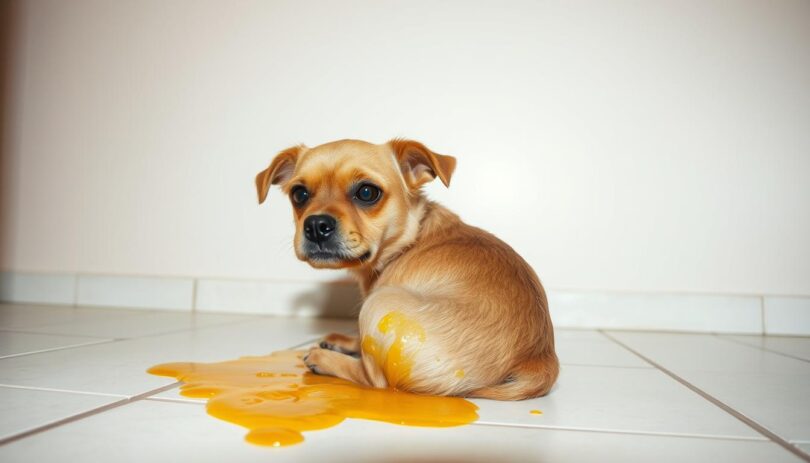Have you ever wondered why your furry friend sometimes experiences loose or liquid stools? Diarrhea in dogs is more than just an occasional inconvenience—it’s a symptom that can signal various underlying issues. Understanding what causes diarrhea is crucial for providing the best care for your pet.
Diarrhea is not a disease itself but rather a sign of something amiss in your dog’s digestive system. It can be triggered by something as simple as eating the wrong food or something more serious like infections or toxins. As a pet owner, it’s essential to recognize the signs and know when to seek expert advice.
In this article, we’ll explore the common causes of diarrhea, when it’s a cause for concern, and practical steps you can take to help your dog feel better. Whether it’s a mild case or something more severe, having the right knowledge can make all the difference in ensuring your pet’s health and wellbeing.
Understanding Dog Diarrhea: What It Is and Why It Happens
Diarrhea in dogs is a common symptom that can arise from various factors. It’s not a disease itself but rather a sign of an underlying issue. Recognizing the signs early can help in addressing the root cause effectively.
Defining Diarrhea in Dogs
Diarrhea is characterized by loose, watery stools that differ from your dog’s normal bowel movements. It can be acute (short-term) or chronic (long-term), each indicating different potential issues.
Symptoms and Observations to Note
Besides loose stools, symptoms may include abdominal discomfort or a change in appetite. Monitoring these signs helps in identifying when veterinary care is necessary.
Even mild symptoms should be watched closely, as they can signal more serious conditions. Early observation allows for timely intervention, ensuring your dog’s health and wellbeing.
Common Causes of Dogs and Diarrhea
Diarrhea in dogs can stem from a variety of factors, each requiring different approaches to address the root cause effectively. Understanding these causes is the first step toward helping your pet recover and preventing future episodes.
Dietary Indiscretion and Food Changes
A sudden change in your dog’s diet or eating something they shouldn’t can often lead to an upset stomach. Foods high in fat or unfamiliar ingredients can trigger diarrhea. Even a new brand of dog food can cause this reaction if introduced too quickly.
Infections, Parasites, and Toxins
Infections from bacteria, viruses, or parasites like Giardia are common culprits. Toxins, whether from spoiled food or accidental ingestion, can also cause diarrhea. These issues often require veterinary attention to prevent serious complications.
Allergies and Internal Health Conditions
Food allergies or sensitivities can lead to chronic diarrhea. Conditions like inflammatory bowel disease or pancreatitis may also be underlying causes. These issues usually need a combination of dietary changes and medical treatment.
Recognizing When to Seek Veterinary Intervention
Understanding when your dog’s condition requires professional care is crucial for their health. While some cases of diarrhea can be managed at home, others demand immediate attention from a vet.
Emergency Warning Signs
If you notice blood in your dog’s stools, it’s a clear sign to contact a vet. Other emergency signs include persistent vomiting, lethargy, or signs of dehydration like dry gums or sunken eyes.
Emergency situations also include suspected toxin ingestion or foreign body ingestion. Acting swiftly in these cases can prevent serious complications.
When Monitoring at Home Is Sufficient
If your dog has mild diarrhea without additional symptoms, monitoring at home may be enough. Ensure they stay hydrated and recover within a day or two.
However, if diarrhea lasts more than 24 hours or is accompanied by lethargy, it’s time to contact a vet. Persistent symptoms can indicate underlying issues needing professional care.
Effective At-Home Management and Bland Diet Solutions
When your dog experiences mild digestive upset, managing it at home can be effective with the right approach. A bland diet is often recommended to help your pet recover smoothly.
Implementing a Bland Diet for Recovery
A bland diet typically consists of boiled chicken and white rice. These foods are easy on the stomach, reducing irritation and allowing the digestive system to heal. The recommended ratio is 2:1 (carbohydrate to protein), ensuring your dog gets the necessary nutrients without overloading their system.
Start by withholding food for 12-24 hours to let their stomach settle. Then, offer small, frequent meals. For small dogs, 1-2 tablespoons of the mixture, and for medium to large dogs, 1/8 to 1/4 cup is ideal. Gradually reintroduce their normal food over 2-3 days to prevent relapse.
Maintaining Hydration and Comfort
Hydration is key during recovery. Ensure your dog always has fresh water. Monitor for signs of dehydration like dry gums or sunken eyes. If symptoms persist beyond 24 hours or worsen, consult a vet immediately.
By following these steps, you can help your dog feel better and prevent future episodes. Always prioritize their comfort and health with proper care and attention.
Understanding Veterinary Diagnostics for Diarrhea
Veterinarians play a crucial role in pinpointing the root cause of your pet’s digestive issues. A thorough diagnostic process ensures effective treatment and prevents complications.
Overview of Physical Exams and History
A physical exam and medical history are the first steps in diagnosing the cause of diarrhea. Your veterinarian will look for signs of dehydration, abdominal tenderness, or other systemic issues. Sharing details about your pet’s diet, recent activities, and symptom onset helps narrow down potential causes.
Diagnostic Tools: Blood Work, Fecal Exams, and Imaging
Blood work can reveal infections, inflammation, or metabolic issues. Fecal exams check for parasites or infections. Imaging techniques like X-rays or ultrasounds help visualize the gastrointestinal tract for obstructions or inflammation.
Timing is key for accurate results. For instance, multiple stool samples may be needed to detect parasites, while blood tests should be done when symptoms are most apparent. Early diagnostics can prevent complications and speed up recovery.
Treatment Strategies: Medications, Fluid Therapy, and Diet Adjustments
Treating your canine companion’s digestive issues often requires a combination of medical and dietary approaches. The right strategy depends on the root cause of the problem, ensuring effective relief and recovery.
Medications, Probiotics, and Anti-parasitics
Antibiotics are prescribed when bacterial infections are the cause. For example, they’re effective against infections like Clostridium perfringens. However, they’re not always necessary, as some cases may resolve without them. Anti-parasitic medications are essential if parasites like coccidia or whipworms are present.
Probiotics play a beneficial role by restoring gut balance. Studies show they can shorten recovery time for dogs with acute issues. Your vet may recommend specific strains for the best results.
Fluid Therapy and Nutritional Support
Fluid therapy is crucial for preventing dehydration, especially in severe cases. Intravenous or oral rehydration solutions help maintain electrolyte balance and support your dog’s recovery.
Nutritional adjustments are key. A bland diet of boiled chicken and white rice can soothe the digestive system. Foods rich in fiber, like canned pumpkin, may also be recommended to normalize stool consistency.
In some cases, especially with conditions like parvovirus, hospitalization may be necessary to provide intensive care and monitoring.
Final Thoughts and Next Steps for Caring for Your Canine Companion
Caring for your pet during a digestive upset can be challenging, but with the right approach, you can help them recover smoothly. Understanding the root cause of the issue is key to effective care.
If your puppy shows signs of distress or ingests something unusual, like a bone, it’s crucial to act quickly. Keep an eye out for any blockage signs, as they can lead to serious complications. Always monitor the amount of food your pet consumes to prevent overeating, which can cause diarrhea.
Here are some final tips to support your pet’s health:
- Watch for signs of dehydration, such as dry gums or lethargy.
- Know when to seek professional advice, especially if symptoms persist or worsen.
- Give your dog a bland diet to soothe their stomach during recovery.
In cases where diarrhea persists, it’s important to consult a vet promptly. They can provide the necessary treatment and ensure your pet recovers fully. Remember, your pet’s health is in your hands, and with the right care, they can thrive.
FAQ
When is diarrhea in my dog an emergency?
Diarrhea becomes an emergency if your dog shows severe symptoms like bloody stools, vomiting, lethargy, or refusal to drink water. Seek immediate veterinary care in such cases.
Can I feed my dog a bland diet when they have diarrhea?
Yes, a bland diet of boiled chicken and white rice can help soothe your dog’s digestive system. However, always consult your vet before making dietary changes.
How soon should I contact my vet if my dog has diarrhea?
Contact your vet within 24-48 hours if diarrhea persists or is accompanied by vomiting, lethargy, or loss of appetite. Puppies and senior dogs need urgent attention.
Can I manage my dog’s diarrhea at home?
Mild diarrhea can often be managed at home with a bland diet and hydration monitoring. However, consult your vet if symptoms worsen or persist beyond a few days.
What tests might my vet run to diagnose the cause of diarrhea?
Your vet may conduct a physical exam, blood work, fecal tests, or imaging to determine the cause, whether it’s infection, parasites, or another health issue.
How long does it typically take for a dog’s diarrhea to resolve?
Diarrhea usually resolves within 1-3 days with proper care. Persistent cases may take longer and require veterinary intervention to address underlying causes.










Leave a Comment